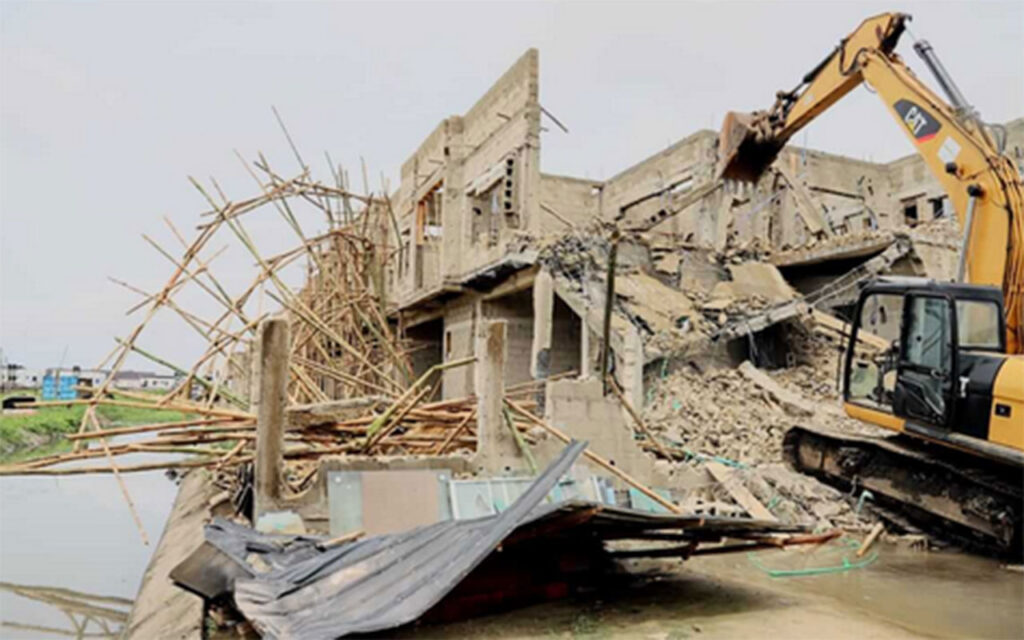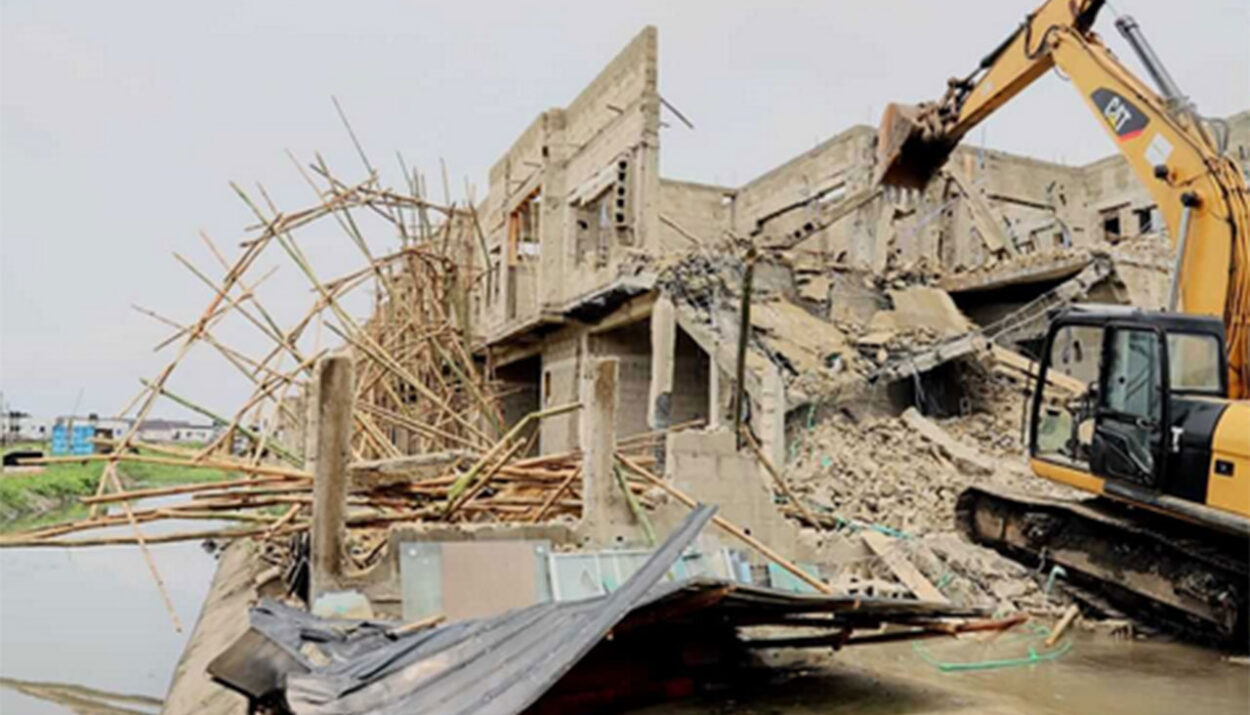
The recent demolition campaign undertaken by the Lagos State Government serves as a stark reminder of the critical importance of adhering to building regulations and obtaining the necessary approvals before embarking on construction projects. In an effort to address environmental issues and ensure public safety, the government’s decisive actions highlight the consequences that property owners may face when failing to comply with applicable state legislation.
In Nigeria, obtaining regulatory approvals before initiating a building construction project is crucial to ensure compliance with relevant laws and regulations. The specific requirements may vary depending on the location and type of construction, but here are some common regulatory compliances that individuals should consider;
- Land Title and Ownership Documentation: Verify land ownership and obtain the necessary title documents, including a Certificate of Occupancy (C of O) or other relevant land title.
- Planning and Development Permits: Obtain planning and development permits from the appropriate government agency, which may include submitting site plans, environmental impact assessments, and architectural drawings.
- Environmental Impact Assessment (EIA): For projects with potential environmental impact, conduct an Environmental Impact Assessment and obtain approval from the Federal Ministry of Environment or relevant state environmental agency.
- Survey and Building Layout Approvals: Conduct a land survey and obtain approval for the building layout from relevant authorities, which may include local planning departments.
- Approval from State Environmental Agencies: Obtain environmental clearance and approval from state environmental agencies to ensure compliance with environmental regulations.
- Approval from Local Planning Authorities: Seek approval from local planning authorities or municipal councils for the construction project.
- Structural Design Approval: Submit structural designs to relevant engineering bodies for approval to ensure compliance with structural and safety standards.
- Building Construction Permit: Obtain a building construction permit from the local building control agency or department responsible for regulating construction activities.
- Occupancy Permit: After construction is complete, obtain an occupancy permit from the relevant authorities, indicating that the building is safe for habitation.
- Clearance from Utilities: Obtain clearance from utility companies, such as electricity, water, and telecommunications, to ensure the construction does not interfere with existing utility infrastructure.
- Fire Safety Compliance: Ensure compliance with fire safety regulations, including obtaining approval for fire safety measures, emergency exits, and firefighting equipment.
- Health and Safety Compliance: Adhere to health and safety regulations, implement safety measures, and obtain necessary approvals for construction worker safety.
- Approval for Access Roads and Driveways: Obtain approval for access roads and driveways leading to the property from relevant transportation authorities.
- Payment of Development Levies and Fees: Fulfill financial obligations, including the payment of development levies, permit fees, and other charges required by local authorities.
- Community Engagement and Consent: Depending on the project and location, engage with the local community, obtain their consent, and address any community-specific requirements
- Heritage and Archaeological Clearance: If the construction site has historical or archaeological significance, obtain clearance from relevant heritage authorities.
- Regulatory Compliance Updates: Stay informed about any updates or changes in building codes, regulations, and policies that may impact the construction project.
To ensure comprehensive compliance, individuals should consult with local authorities, legal professionals, and construction experts who can provide guidance specific to the project’s location and nature. Keep in mind that the regulatory landscape may evolve, and it is essential to stay updated on any changes in laws or regulations that may affect construction activities.
Navigating the regulatory landscape for building construction in Nigeria involves engaging with various governmental and regulatory bodies.
Some of the Various Professional Regulatory Boards in the Nigeria Construction Industry are;
Lagos State Building Control Agency (LASBCA)
LASBCA, the Lagos State Building Control Agency, is a crucial regulatory body in Nigeria, particularly in Lagos State, responsible for overseeing and regulating building construction activities. LASBCA plays a pivotal role in ensuring that construction projects adhere to established standards, safety protocols, and environmental regulations.
Responsibilities of the Lagos State Building Control Agency (LASBCA)
- Plan Approval: LASBCA is responsible for reviewing and approving building plans submitted by property owners or developers. This involves evaluating architectural drawings, structural designs, and other relevant documents to ensure compliance with building codes and regulations.
- Construction Permits: Issuing construction permits is a key function of LASBCA. Before commencing any construction work, individuals must obtain a permit from LASBCA to ensure that the project meets safety and regulatory standards.
- Site Inspections: LASBCA conducts regular site inspections to monitor ongoing construction projects. This ensures that construction activities align with approved plans and comply with building codes and regulations.
- Building Certification: After the successful completion of a construction project, LASBCA provides building certification or an occupancy permit. This certifies that the structure is safe for habitation and meets all regulatory requirements.
- Enforcement of Building Codes: LASBCA enforces building codes and regulations to address any deviations or violations. This includes taking corrective actions, such as issuing stop-work orders or, in extreme cases, demolishing structures that pose safety or environmental hazards.
Obtaining Approvals from LASBCA:
- Engage with Architects and Consultants: Work with architects, engineers, and other professionals to prepare comprehensive architectural drawings and structural designs that meet LASBCA’s requirements.
- Submit Building Plans: Submit the building plans, including architectural drawings and structural designs, to LASBCA for review. This can usually be done at the LASBCA office or an assigned planning office in the local government area.
- Payment of Fees: Pay the required fees for plan review, construction permits, and other regulatory processes. Fees may vary based on the nature and size of the construction project.
- Plan Review and Approval: LASBCA conducts a thorough review of the submitted plans to ensure compliance with building codes and regulations. Upon approval, the agency issues a construction permit, allowing the project to commence.
- Site Inspections: LASBCA conducts site inspections during various stages of construction to verify that the work aligns with the approved plans. It is essential to cooperate with LASBCA officials during these inspections.
- Final Certification: Upon completion of the construction project and satisfactory compliance with regulations, LASBCA issues a final certification or occupancy permit, signifying that the structure is fit for habitation.
- Compliance with Regulations: Throughout the construction process, ensure ongoing compliance with building codes, safety standards, and environmental regulations to avoid any enforcement actions by LASBCA.
- Regular Updates: Stay informed about any updates or changes in LASBCA’s procedures, regulations, or requirements. This can be done through communication with LASBCA officials or by regularly checking official publications.
Individuals involved in construction projects in Lagos State should engage with LASBCA from the planning stage, seeking their guidance and approvals to ensure a smooth and legally compliant construction process. Regular communication, adherence to regulations, and collaboration with professionals are key to obtaining approvals from LASBCA in Nigeria.
Lagos State Physical Planning Permit Authority (LASPPPA)
Lagos State Physical Planning Permit Authority (LASPPPA) otherwise known as Planning Permit Authority. The duties include granting of approval and Monitoring of Layouts and Development Schemes for both Government and Private Estates.
Responsibilities of the Lagos State Physical Planning Permit Authority (LASPPPA)
- Policy Formulation and Implementation: Initiate, formulate, and implement physical planning, urban development, and urban renewal policies and programs to guide sustainable development in Lagos State.
- Planning Document Preparation: Prepare Regional, Master, Model City Plans, as well as Action and Development plans for Excised Villages to provide a comprehensive framework for land use and development.
- Approval and Monitoring of Layouts: Grant approval and monitor layouts and development schemes for both government and private estates to ensure compliance with planning regulations and standards.
- Evaluation and Relocation: Evaluate, relocate, and regularize urban-based developments and activities, including but not limited to filling stations, banks, eateries, markets, institutions, and informal sectors.
- Electronic Document Management and GIS: Implement Electronic Document Management and Geographic Information System (EDEMS & GIS) to enhance efficient storage and retrieval of planning-related data.
- Site Selection for Government Agencies: Conduct site selection for government agencies and other institutions to optimize urban space utilization.
- Supervision and Coordination: Supervise the activities of related agencies such as the Lagos State Building Control Agency, Lagos State Urban Renewal Agency, and ensure coordination among these bodies.
- Inter-Agency Linkages: Establish and maintain inter-agency linkages to foster collaboration and information-sharing among relevant government bodies.
Overview of the Ministry’s Activities
- Preparation and Review of Development Plans: Engage in the preparation and periodic review of various development plans for different regions, including but not limited to Lekki, Badagry, Alimosho, Lagos Mainland Central, Agege, Apapa, Lagos Island West, and Issa Williams.
- Urban Regeneration Projects: Undertake urban regeneration initiatives, including projects such as Freedom Park, Tejuosho Market, Isale Gangan, Resettlement of Saw Millers from Oko-Baba to Agbowa-Ikosi, Relocation of Computer Village Ikeja to Katangowa, and the Redevelopment of LASURA premises.
- Right of Way Establishment: Establish and recover Right of Way alignment for existing and proposed roads, contributing to major infrastructure projects such as Lekki – Epe Expressway Expansion, Lagos – Badagry 10-lane Expansion and Light Rail Project, Lagos Coastal Road, Mile 12-Ikorodu Road BRT Expansion, and the 4th Mainland Bridge.
- Site Selection for Various Uses: Identify suitable locations for various purposes, including street lighting at Obalende Bus Terminus, Educational & Spiritual Youth Empowerment Centre, and provide Planning Information for proposed developments.
- Approval of Private Layouts/Estate Schemes: Grant approval for private layouts and estate developers’ schemes, exemplified by the approval of layouts for Ologolo Village excision, Good Head Projects Ltd. along Eleko/Folu Road, Akodo, and the preparation of development guide plans for excised villages.
- E-Planning Development: Lead the development of an e-planning process and archival system to streamline planning procedures and enhance data management.
- Development Permit Processing and Gazette: Process, grant, and gazette Development Permits, ensuring that approved developments align with established regulations.
- Development Control and Monitoring: Implement development control measures, monitor physical developments, and conduct periodic audits to ensure adherence to planning standards.
- Identification and Removal of Distressed Buildings: Identify, remove, and publish information about distressed buildings, contributing to public safety and urban aesthetics.
This outlines the multifaceted responsibilities and activities undertaken by LASPPPA and its associated ministry in facilitating planned and sustainable urban development in Lagos State.
The Ministry of Environment
The Ministry of Environment in Nigeria is responsible for overseeing environmental policies, regulations, and initiatives across the country. Environmental governance in Nigeria involves various levels of government, from federal to state and local. The ministry’s primary functions include environmental protection, conservation, and sustainable development. Here is an overview of the typical responsibilities of the Ministry of Environment and the general process for obtaining approvals:
Responsibilities of the Ministry of Environment:
- Environmental Policy Formulation: Develop and implement national and state-level environmental policies to address issues such as pollution, biodiversity conservation, and climate change.
- Environmental Impact Assessment (EIA): Oversee the EIA process, ensuring that major projects undergo environmental assessments to identify potential impacts and propose mitigation measures.
- Natural Resource Management: Manage and conserve natural resources, including forests, water bodies, and biodiversity, to promote sustainability and biodiversity conservation.
- Waste Management: Develop and implement strategies for effective waste management, including waste reduction, recycling, and the safe disposal of hazardous waste.
- Climate Change Mitigation and Adaptation: Address climate change issues by implementing mitigation and adaptation strategies, as well as participating in international climate agreements.
- Air and Water Quality Monitoring: Monitor and regulate air and water quality to ensure compliance with environmental standards and protect public health.
- Environmental Education and Awareness: Promote environmental education and awareness campaigns to encourage public participation in environmental protection and conservation efforts.
- Enforcement of Environmental Laws: Enforce environmental laws and regulations, taking legal action against individuals or entities that violate environmental standards.
Process for Obtaining Approvals from the Ministry of Environment:
- Project Identification: Identify whether the proposed project falls under the category that requires environmental approval. Projects with potential environmental impacts are typically subject to the EIA process.
- Engage Environmental Consultants: Hire qualified environmental consultants to conduct an EIA for the proposed project. These consultants will assess potential environmental impacts and propose mitigation measures.
- Submit EIA Report: Submit the comprehensive EIA report, along with other required documentation, to the Ministry of Environment. This submission initiates the approval process.
- Review by the Ministry: The Ministry of Environment reviews the submitted EIA report to ensure that it meets regulatory requirements and adequately addresses potential environmental impacts.
- Public Consultation: In some cases, the ministry may require public consultation to gather input from local communities and stakeholders affected by the proposed project.
- Approval or Rejection: Based on the review and public consultation, the Ministry of Environment may approve the project with specific conditions or reject it if it poses significant environmental risks.
- Compliance Monitoring: After approval, the ministry monitors the project’s compliance with the conditions set during the approval process to ensure ongoing adherence to environmental standards.
It’s essential to note that specific procedures may vary depending on the nature and scale of the project, and requirements may change over time. Individuals or organizations planning projects with potential environmental impacts should consult directly with the Ministry of Environment or relevant state environmental agencies for the most accurate and current information on the approval process. Additionally, engaging with environmental consultants experienced in Nigerian regulations can facilitate a smoother approval process.
Lagos State Material Testing Laboratory, LSMTL
The laboratory is to test all building and civil engineering materials for standards. Such tests include: –
- Soil Mechanics, Sub-soil Investigation, Aggregate, Cement, Water and Chemical Test, Test on Concrete, Blocks, Bricks, Ceramics, Roofing Sheets, Wood & Refractory Products.
- Test on Asphaltic Concrete (Bituminous Road), Test on Steel Reinforcements, round and flat bars.
- Calibration of all test Equipment/Registration (Private Independent Laboratory), Certification of Installed Lightning/Thunder Arrestors on Structures and Telecommunication Mast.
The Lagos State Safety Commission (LSSC)
The Lagos State Safety Commission (LSSC) is a regulatory agency in Nigeria, particularly in Lagos State, responsible for ensuring and promoting safety and health standards in various sectors. The commission typically oversees and regulates safety practices in workplaces, events, and public spaces.
Responsibilities of Lagos State Safety Commission:
- Workplace Safety: Develop and enforce safety standards in workplaces to protect employees and ensure compliance with occupational health and safety regulations.
- Event Safety: Regulate safety measures for public events, ensuring that organizers implement appropriate precautions to safeguard attendees.
- Building and Structural Safety: Monitor and enforce safety standards for buildings and structures, including compliance with construction and fire safety regulations.
- Emergency Preparedness: Promote and oversee emergency preparedness plans to respond effectively to accidents, disasters, or other safety-related incidents.
- Safety Training and Education: Conduct safety training programs and educational initiatives to raise awareness and build capacity for safe practices in various sectors.
- Licensing and Permitting: Issue safety permits and licenses for events, construction projects, and other activities, ensuring that safety standards are met.
Obtaining Approvals from Lagos State Safety Commission:
- Identify Safety Requirements: Determine the specific safety requirements applicable to the activity or project. Different sectors may have distinct safety standards and regulations.
- Engage with LSSC Officials: Contact the Lagos State Safety Commission to discuss safety requirements and the approval process. This may involve consultations or pre-application meetings.
- Submit Application: Fill out the necessary application forms provided by the Lagos State Safety Commission. Include all required documentation related to safety plans and precautions.
- Safety Assessment: LSSC officials will assess the safety plans and documentation submitted to ensure compliance with safety standards and regulations.
- Inspections (If required): Depending on the nature of the activity or project, LSSC may conduct on-site inspections to verify that safety measures are implemented as outlined in the application.
- Approval Decision: The Lagos State Safety Commission will communicate the approval decision. This could include approval with conditions, requests for modifications, or, in some cases, rejection.
- Issuance of Safety Permits: If approved, the Lagos State Safety Commission will issue the necessary safety permits or licenses, allowing the activity or project to proceed.
- Compliance and Monitoring: Ensure ongoing compliance with the safety conditions specified in the approval. LSSC may conduct periodic monitoring to verify continued adherence to safety standards.
Conclusion:
The recent actions by the Lagos State Government underscore the significance of obtaining proper approvals and adhering to building regulations before embarking on construction projects. Property owners in Nigeria, particularly in Lagos, should take heed of these developments to avoid the risk of having their structures demolished and to contribute to the creation of a safer and more orderly living environment for all citizens. By understanding and complying with regulations, residents can actively participate in the collective effort to restore environmental integrity and promote public safety.







